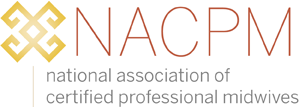State licensure, combined with national certification, is essential to the future of CPMs. Twenty years after creation of the CPM credential, 24 of the 29 states that license direct-entry midwives recognize the CPM credential as a route to licensure. (see a state-by state chart here.) While there are many obstacles to achieving licensure in every state, CPMs are finding exciting new ways forward with support from NACPM and the work we’ve accomplished with other national midwifery organizations in the US MERA (Midwifery, Education, Regulation, and Association) collaboration.
The significance of this work is reflected in ACOG’s 2015 statement endorsing the ICM Standards and 2016 statement supporting the Bridge Certificate. NACPM is building a toolkit of resources for advocates that includes new fact sheets, background information on midwifery regulation, national certification, and educational program accreditation; and tools to support advocating for good regulation based on national and international standards. Watch the NACPM website for resources as they become available!
This year, legislation was passed in Maine to license CPMs. This was accomplished through a very interesting process of consensus-building among a range of stakeholder groups, including CPMs, nurse-midwives, consumers, physicians, nurses, and state officials. Using a professional facilitator, these stakeholders met for more than a year to discuss qualifications, scope of practice, accountability, and more. Agreeing to include legislative language endorsed by the US MERA organizations was pivotal to their progress. Referencing the US MERA Principles for Model Midwifery Legislation and Regulation, which are based on international standards, also proved helpful to strengthening the proposed legislation. As always, some creative problem-solving was also required. Now that the licensing law has passed, new opportunities are emerging for CPMs to impact quality of care issues in the state thanks to the relationships built in their legislative collaboration. To learn more about this fascinating story, tune into NACPM’s Legislation and Policy Webinar Series on October 6, 2016 or visit the NACPM webinar page after that date for a recorded version.
CPMs and their advocates are actively pursuing legislation in Kentucky and Illinois. They are also finding that there is new support for their efforts because they’ve chosen to incorporate the international standards for midwifery using the language regarding qualifications adopted by the U.S. MERA collaboration. The October 6th webinar will also feature representatives from these states describing the opportunities and challenges unfolding this year.
NACPM is fully committed to supporting state licensure for CPMs. More women will have access to midwifery care when all CPMs are legally authorized to provide services. Midwifery regulation, which varies state-by-state, will be improved when state laws are based on national certification. Midwives will be able to move more easily from one jurisdiction to another when state laws are more consistent. More childbearing families, health professionals, public policymakers and third party payers will understand and value the contributions of CPMs when they are recognized in every state. Be sure to join us as we explore these topics in future webinars and support NACPM by becoming a member today.

